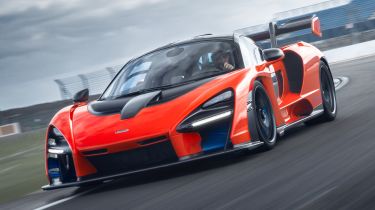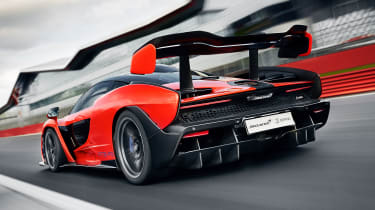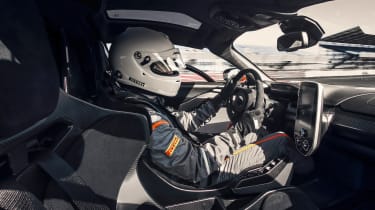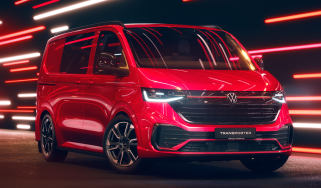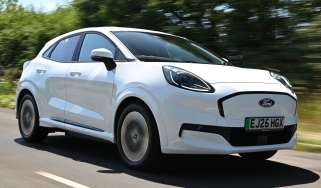New McLaren Senna 2018 review
It may be road legal, but the 789bhp McLaren Senna does away with everyday usability in exchange for an intense drive
The Senna is awaiting sign-off, but this is expected to be the production spec. Buyers lucky enough to have an order are unlikely to be disappointed, based on this drive. It takes some car to carry the Senna name with confidence, but this McLaren is an intense experience like few others.
McLaren’s road-legal track day weapon isn’t officially launched until next month, but final testing has nearly finished and Auto Express has driven the validation prototype at Silverstone.
The Senna takes performance to the extreme at the expense of the everyday usability you might find in, say, a 720 S. The familiar McLaren 4.0-litre V8 now produces an incredible 789bhp and has to propel just 1,198kg, meaning ferocious acceleration; think 0-62mph in just 2.8 seconds, and 0-124mph in only 6.8 seconds. Top speed is 211mph, and the race-bred Senna develops a huge 800kg of downforce at 155mph.
• Best track day cars on sale 2018
Once you’ve fallen down into the carbon-fibre seat, you’re clamped in securely by the four-point harness. The cabin is spartan, but visibility is excellent. The baritone roar from the V8 motor is domineering, even at idle, but once the lightweight door has clicked shut, it’s mainly a low-frequency hum that permeates through a full-face helmet.
Thanks to McLaren’s twin-clutch gearbox, no special technique is required for moving away; you simply select first gear with a squeeze of the right-hand paddle behind the wheel and brush the accelerator pedal.
Used - available now

2022 Volkswagen
T-Roc
30,623 milesAutomaticPetrol1.5L
Cash £17,999
2026 Volvo
XC40
24,198 milesAutomaticPetrol2.0L
Cash £24,350
2023 Kia
Picanto
10,609 milesManualPetrol1.0L
Cash £11,086Thereafter, the Senna needs to be driven with purpose, McLaren claims, because the car’s brakes are a new generation of carbon-ceramic discs and require heat and commitment to work.
Emerging from the pitlane, the Senna piles on speed with dramatic energy, the brake pedal feels hard underfoot, but reassuring at the same time as we near the first proper corner. Across the link section, and then on to the long Hangar Straight for the first time, there’s the first chance to really let the Senna run wild.
The pace on straights is bruising, all-consuming, and completely crackers. The noise is deafening, the gearchanges virtually instant, and the speed pushes your concentration to the maximum.
But there are two aspects of the car that rank even higher than the Senna’s potency, and they’re what happens when you hit the brake pedal and turn the wheel. We have never driven a road-legal car with this braking ability. Hit the pedal as hard, and as late, as you dare before Stowe corner, and despite being deep into three-figure speeds the Senna just stops – no fuss, no drama.
Cursing a lack of commitment, we turn into the long right-hander and curse again, because it’s obvious we could be going appreciably quicker.
There is plenty to admire at this moment, from the steering’s beautiful directness and feel to the agility and stability of the chassis, but it’s that invisible partner ‘downforce’ that’s the key.
Over the next half-dozen laps we try and raise our game, braking even later, despite one half of the brain screaming at the other to hit the pedal now, and learning to lean on the colossal aerodynamic grip and Pirelli Trofeo Rs with increasing confidence.
By the final lap we are getting tired; feeling the need to pit, take a breather, mull things over and head out again with a fresher mind. That’s a mark of just how intense the Senna driving experience is.
